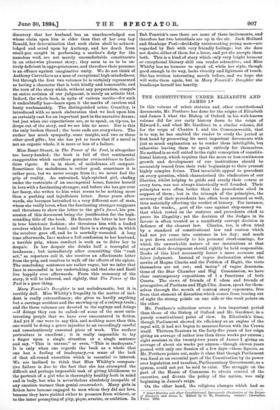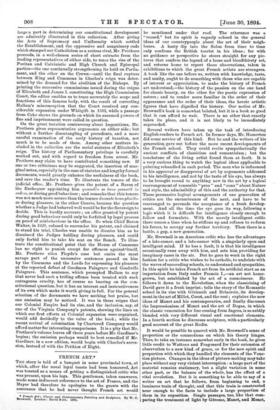THE CONSTITUTION UNDER ELIZABETH AND JAMES I.* IN this volume
of select statutes and other constitutions/ documents, Mr. Prothero has done for the reigns of Elizabeth and James I. what the Bishop of Oxford in his well-known volume did for our early history down to the reign of Edward I., and what Mr. Gardiner, in a similar volume, did for the reign of Charles I. and the Commonwealth, that is to say, he has enabled the reader to study the period at first hand by presenting its most important documents with just so much explanation as to render them intelligible, but otherwise leaving them to speak entirely for themselves. No method is so well suited to the right conception of constitu- tional history, which requires that the more or less continuous growth and development of our institutions should be accurately traced from their rude beginnings to their present highly complex forms. That invariable appeal to precedent on every question, which characterised the vindicators of our liberties, whilst helping to guide and steady their course at every turn, was not always historically well founded. Their principles were often better than the precedents cited in support of them ; but in the triumph of the principles, the accuracy of their precedents has often been assumed as well,. thus materially affecting the verdict of history. For instance,. much the weake„ _ part of the case against ship-money wa that which rested on the statutes and precedents cited to prove its illegality; yet the decision of the Judges in its favour is often treated as a manifestly corrupt decision in defiance of the clearest law. Charles, too, is often tried by a standard of constitutional law and custom which had not yet come into existence in his day; and much is put down exclusively to his personal short-comings, for which the unworkable nature of our institutions at that stage of their development should rightly be held responsible. Books of this kind necessarily foster a more accurate and fairer judgment. Instead of vague declamation about the merits of Magna Charts, and the Petition of Right, the texts themselves are set out; and insteq' of vague denuncia- tions of the Star Chamber and Hi Commission, we have clear contemporary expositions of e functions of both Courts. The views of friends of f edom and friends of prerogative, of Puritans and High Chu Amen, speak for them- selves through the mouth of conteni orary exponents, free from that element of distortion which comes from leaving out of sight the strong points on one side or the weak points on the other.
Mr. Prothero's collection covers a less important period than those of the Bishop of Oxford and Mr. Gardiner, in a purely constitutional point of view. In Elizabeth's time, though Parliament showed its efficiency as an engine of the royal will, it had not begun to measure forces with the Crown itself. Thirteen Sessions in the forty-five years of her reign giving an average of rather less than three weeks per annum ; eight sessions in the twenty-two years of James I. giving an average of about six weeks per annum—though eleven years passed with only one Session of a few days—these figures, as Mr. Prothero points out, make it clear that though Parliament was fixed as an essential part of the Constitution by its power over legislation and taxation, Parliamentary Government, as a. system, could not yet be said to exist. The struggle on the part of the House of Commons to obtain control of the executive, and dictate the policy of the nation, was only beginning in James's reign.
On the other hand, the religious changes which had so * Select Statutes and other Constitutional Documents illustrative of the R of Elizabeth and James I. Edited by G. W. Prothero. Oxford: OIetendou Press. 1884.
large a part in determining our constitutional development are admirably illustrated in this collection. After giving the Acts of Supremacy and Uniformity which settled the Establishment, and the oppressive and sanguinary code which stamped out Catholicism as a serious rival, Mr. Prothero proceeds, in a well-chosen series of short extracts from the leading representatives of either side, to trace the rise of the Puritan and Calvinistic and High Church and Episcopal parties—the one continually strengthening its hold on Parlia- ment, and the other on the Crown—until the final rupture between King and Commons in Charles's reign was deter- mined by the demand for the abolition of the Bishops. By printing the successive commissions issued during the reigns of Elizabeth and James I. constituting the High Commission Court, the editor enables us to trace accurately the scope and functions of this famous body, with the result of correcting Hallam's misconception that the Court received any con- siderable expansion under Whitgift in 1583, while a passage from Coke shows the grounds on which its assumed powers of fine and imprisonment were called in question.
On the great taxation controversy about Impositions, Mr. Prothero gives representative arguments on either side ; but without a further disentangling of precedents, and a more careful examination of the early history of taxation, not much is to be made of them. Among other matters in- cluded in the collection are the social statutes of Elizabeth's reign. The history of Parliamentary privilege is carefully worked out, and with regard to freedom from arrest. Mr. Prothero may claim to have contributed something new. If one or two criticisms may be suggested, the insertion of mar- ginal notes, especially in the case of statutes and lengthy formal documents, would greatly enhance the usefulness of the book, and save the reader's time. To illustrate the tenure of the judicial office, Mr. Prothero gives the patent of a Baron of the Exchequer appointing him quarnclin se bene gesserit in eodem, or during good behaviour; and remarks that this tenure was not much more secure than the tenure durante bene-placito' or during pleasure, in the other Courts, because the question whether a Judge had behaved well would be for the Sovereign to decide. This is hardly accurate ; an office granted by patent during good behaviour could only be forfeited by legal process on proof of misbehaviour in the office. So when Chief Baron Walter, in 1629, refused to surrender his patent, and claimed to stand his trial, Charles was unable to dismiss him as he dismissed the Judges holding during pleasure, and could only forbid him to take his seat on the Bench. To illus- trate the constitutional point that the House of Commons has no right to punish except for offences against•itself, Mr. Prothero cites Floyde's case but omits the most savage part of the successive sentences passed on him by the Commons and the Lords for expressing his pleasure at the reported defeat of Goodman Palsgrave and Goodwife Palsgrave. This sentence, which prompted Hallam to say that never had such a trifling offence been treated with such outrageous cruelty, has of course no bearing on the con- stitutional question, but it has an interest and instructiveness of its own which make it worth giving in full. For the general selection of the documents we have nothing but praise, but one omission may be noticed. It was in these reigns that our Colonial Empire had its rise, and the inclusion, say, of one of the Virginia Company's patents, showing the lines on which our first efforts at Colonial expansion were organised, would add decidedly to the value of the book; while the recent revival of colonisation by Chartered Company would afford matter for interesting comparisons. It is a pity that Mr. Prothero's volume leaves off three years before Mr. Gardiner's begins ; the omission perhaps would be best remedied if Mr. Gardiner, in a new edition, would begin with Charles's acces- -sion, instead of with the Petition of Right.



















































 Previous page
Previous page